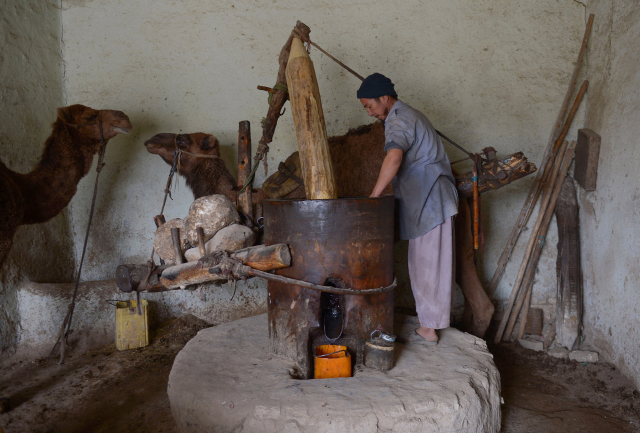Camel power turns sesame into precious oil in Afghanistan

An Afghan man extracting oil from vegetables using traditional methods whilst working with a camel in Mazar-i-Sharif. Image: AFP/Farshad Usyan
Old Afghan men looking to soothe their aching joints or enrich their rice dishes stand around a tiny shop where they are lulled by a camel’s steady steps as sesame oil flows into a plastic bucket.
The traditional industry in northern Afghanistan is the domain of ethnic Turkmen, though its origins seem unclear. The sesame are pressed not by hand but by camel power to extract their precious oil.
Two of the animals take turns every couple of hours walking around in circles in the cramped space, a pack on their shoulders supporting a mast that drives the wooden press, a patch covering one eye to narrow their gaze.
Chari Amini has taken over the business started by his father and his 12-year-old son is already helping him as he prepares to become the next generation of sesame oil producers.
Amini buys sesame at the local market, which are grown between rows of wheat, hashish and poppies in the fertile soil of Balkh province, which borders Turkmenistan and Uzbekistan.
If the seeds are of good quality, one kilogram can produce half a litre of oil.
“We are about 35 producers in Mazar-i-Sharif, all Turkmen, and we all know each other,” says Amini, his bald head covered with a turban, referring to the capital of Balkh.
“We are honest — it’s the key to business,” he explains. “We never stopped during the wars.”
Amini also presses sesame for farmers who bring their harvest to him, charging 100 Afghanis ($1.50) per ser, a traditional unit of weight that is equal to seven kilograms.
Dark chunks of residue are collected and used as fuel in homes.
This modest trade brings Amini 20,000 Afghanis per month — not as lucrative as opium poppy used to produce heroin, but better than the income of a soldier. And it is enough to support his five children.
His shop is one of several facing a wide road in Mazar-i-Sharif, the front entirely open to customers.
Every two hours, his employee Alokozai pours 11 kilograms (24 pounds) of seeds into the press and takes the reins of the camel to guide him around the circle. Alokozai never considered doing anything else with his life, he says, surprised by the question.
“Healthier and sweeter”
Each camel works for 10 hours a day. Amini keeps the animals for 18 months and then resells them “for a profit” once they are muscular.
Roughly 300,000 liters of sesame oil are produced using the traditional method each year in Balkh, according to Zabihullah Zubin, a director at the provincial Department of Agriculture. That provides a livelihood for about 50 producers
About 300 farmers produce sesame but they prefer to sell on the regional market for a higher price — 120 Afghanis per kilo against 90 Afghanis in the Mazar-i-Sharif bazaar, explains Zubin.
This method of producing sesame oil is competing with more efficient industrial presses, of which Mazar-i-Sharif has three.
“They have the food technology, they know how to process, to clean the seeds, do the packaging… the small manual production would need investment and technical support to access the overseas market,” said Zubin.
Joseph Nezam, an Afghan-French businessman, is trying to develop local sesame oil production with the support of the American development agency USAID so they can sell directly into markets abroad.
“Afghanistan has a very good quality sesame but people prefer to sell to neighboring countries that serve as an intermediary to the international market, and help them to produce at European standards,” Nezam says.
Old customers of Amini swear that the camel-pressed sesame oil they use to flavor their traditional Afghan rice dish kabuli palau is “totally organic, healthier, and sweeter” than industrial presses that “burn” seeds by crushing them.
“It’s better than any tablet or medicine,” says Hajji Abdul Ghani Rahmani, a traditional doctor who stops by Amini’s shop to stock up on sesame oil to use at his clinic.
“You can use it and feel better very soon,” he adds, as he massages the knee and leg of an elderly man sitting inside the shop. CC
RELATED STORY: